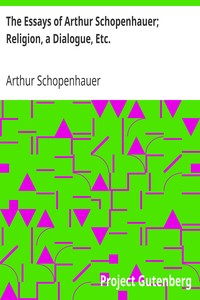The Essays of Arthur Schopenhauer; Religion, a Dialogue, Etc. by Schopenhauer
"The Essays of Arthur Schopenhauer; Religion, a Dialogue, Etc." by Schopenhauer is a philosophical collection of essays likely written in the early 19th century. This volume explores various topics, including religion, pantheism, and the philosophy of reading, showcasing Schopenhauer's significant insights into the human condition, morality, and the metaphysical fabric of society. At the start of the book, a prefatory note introduces Schopenhauer as a philosopher notable for his clarity and his
appeal to everyday experiences. In the dialogue "Religion," characters Demopheles and Philalethes engage in a debate about the nature and function of religion in society. Demopheles defends religion as a vital tool for uplifting the masses and providing moral guidance, while Philalethes critiques it as a veneer over reality that stifles genuine philosophical inquiry and perpetuates ignorance. Their discourse highlights the tension between faith and empirical understanding, with Philalethes arguing for a pursuit of truth independent of religious dogma, ultimately suggesting that the tendency of religion to veil the truth is detrimental to societal progress. This opening sets the stage for Schopenhauer's broader reflections on the complexities of human beliefs and the nature of existence. (This is an automatically generated summary.)
Read or download for free
| How to read | Url | Size | |||
|---|---|---|---|---|---|
| Read now! | https://www.gutenberg.org/ebooks/10833.html.images | 197 kB | |||
| EPUB3 (E-readers incl. Send-to-Kindle) | https://www.gutenberg.org/ebooks/10833.epub3.images | 167 kB | |||
| EPUB (older E-readers) | https://www.gutenberg.org/ebooks/10833.epub.images | 168 kB | |||
| EPUB (no images, older E-readers) | https://www.gutenberg.org/ebooks/10833.epub.noimages | 141 kB | |||
| Kindle | https://www.gutenberg.org/ebooks/10833.kf8.images | 387 kB | |||
| older Kindles | https://www.gutenberg.org/ebooks/10833.kindle.images | 373 kB | |||
| Plain Text UTF-8 | https://www.gutenberg.org/ebooks/10833.txt.utf-8 | 188 kB | |||
| Download HTML (zip) | https://www.gutenberg.org/cache/epub/10833/pg10833-h.zip | 166 kB | |||
| There may be more files related to this item. | |||||
Similar Books
About this eBook
| Author | Schopenhauer, Arthur, 1788-1860 |
|---|---|
| Translator | Saunders, T. Bailey (Thomas Bailey), 1860-1928 |
| Title | The Essays of Arthur Schopenhauer; Religion, a Dialogue, Etc. |
| Credits | E-text prepared by Juliet Sutherland, David King, and the Project Gutenberg Online Distributed Proofreading Team |
| Reading Level | Reading ease score: 48.3 (College-level). Difficult to read. |
| Language | English |
| LoC Class | B: Philosophy, Psychology, Religion |
| Subject | Religion |
| Subject | Philosophy |
| Category | Text |
| EBook-No. | 10833 |
| Release Date | Jan 1, 2004 |
| Most Recently Updated | Dec 21, 2020 |
| Copyright Status | Public domain in the USA. |
| Downloads | 811 downloads in the last 30 days. |
| Project Gutenberg eBooks are always free! | |

